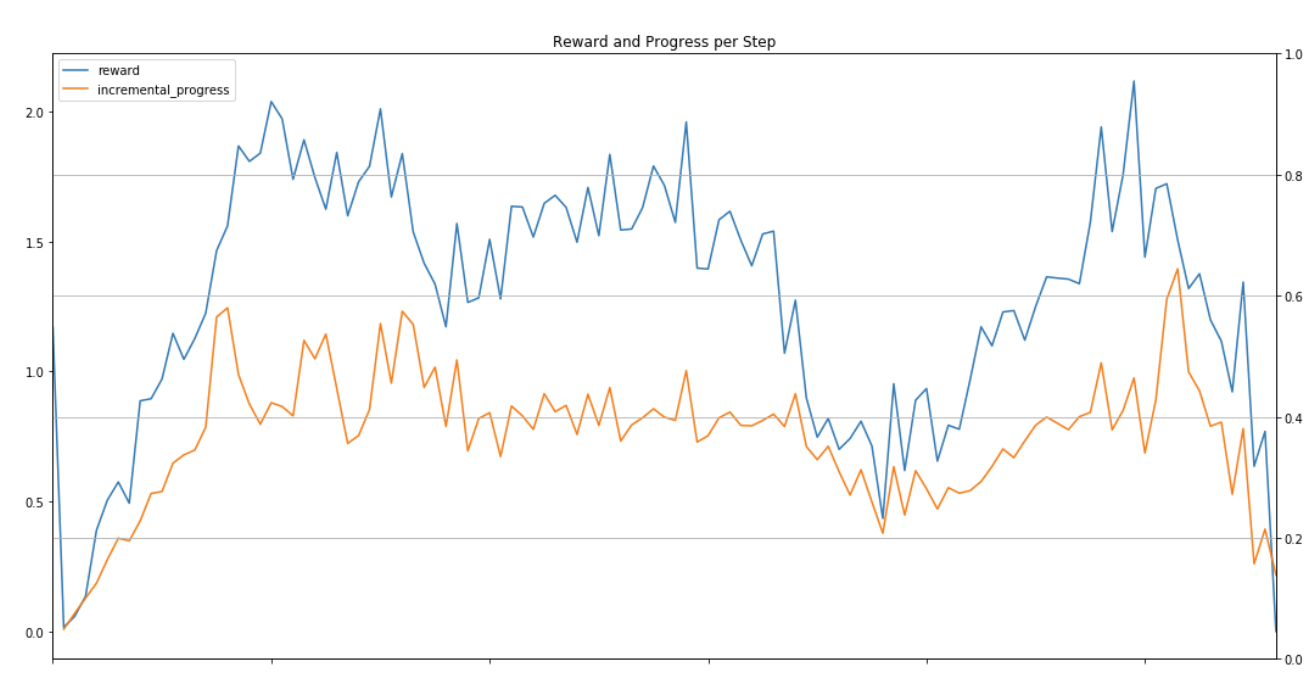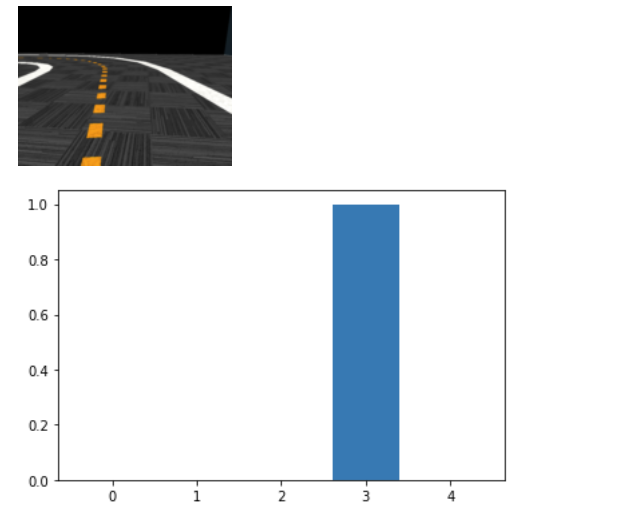This is my full collection of tools, notebooks, scraps for participation in 2019 AWS DeepRacer Virtual League.
What you'll find in this repo:
- Local training assets: container Dockerfiles, launch scripts mostly in bash, monitoring scripts
- AWS cloud-based training scripts: pre-dating my local training setup, but most useful for cloud-based evaluations of local training
- Analysis Notebook
- Models/Experiments: all the training sessions hyperparameters, reward functions, action space
- RoboMaker simapp: scripts to build the bundle, source files to add or replace files within the bundle
- Twitch streaming assets: UI (flask-based), ffmpeg tools to stream from simulation
- Airflow automation DAGs
NB: I am not an expert in ML/RL and participation in DeepRacer was a way to educate myself. Forgive me any naive or wrong approaches taken. Feel free to send me any observations, suggestions for different approaches, related papers or projects, or just to drop me a line.
Race Results
| Race | Standing |
|---|---|
| August 2019 Virtual Race Shanghai Sudu |
102 of 1375 |
| September 2019 Virtual Race Cumulo Carrera |
132 of 1338 |
| October 2019 Virtual Race Toronto Turnpike |
60 of 1983 |
| November 2019 Virtual Race Championship Cup Warm-up |
8 of 904 |
| AI Driving Olympics at NeurIPS | Phase I: Perception challenge: Top 10 Phase II: Simulation to Reality challenge: did not place |
The code and scripts are shared here unfiltered. Some items may be broken or hacky. The goal was to educate myself about reinforcement learning and train competitive models, sometimes at the expense of good coding practices. I'll be starting a new repo for any work I do on the 2020 DeepRacer races and won't be adding any more changes to this code.
I'll follow here with some select items that I hope may be of interest to those looking to compete in the 2020 DeepRacer League.
The official SimApp bundle for DeepRacer is publicly readable and located at https://s3.amazonaws.com/deepracer-managed-resources/deepracer-github-simapp.tar.gz
robomaker/deepracer-simapp.tar.gz.md5 - MD5 of the bundle to verify we're using the correct base for file patches
airflow/monitor_deepracer_simapp.py - Script to monitor the hosted simapp bundle for changes. Currently uses a date-based validation comparing official bundle to a copy stored in an S3 bucket I own
patch/* - overlay files to add or replace files within the bundle. These are mostly local edits to markov package, additional gazebo assets, added parameters to launch files.
scripts/bundle.sh - Create a bundle using the base simapp and overlaying files from patch/.
scripts/publish.sh - Upload the patched bundle to an S3 bucket owned by me, consumable by RoboMaker for running patched simulations in the cloud
This was grown out of necessity and not out of convenience. Therefore it is completely custom for my preferences and does not use the well-known DeepRacer Community training stack on GitHub.
Goals for my local stack were:
- Full access to the simapp bundle code to edit or add files
- Fast iteration on code changes to the simapp bundle using Docker volumes to patch containers
- Unified logging for later analysis
- Replication of all training artifacts to S3, effectively making local storage a "cache" that can be cleared
Components:
- dr-training - Sagemaker/TensorFlow training
- dr-simulation - RoboMaker/ROS/Gazebo simulation
- dr-redis - pub/sub between dr-simulation and dr-training
- dr-logger - "sidecar" logger to aggregate all container logs and write them to JSON files
- dr-uploader - background synchronization of training assets and logs to S3 bucket
- minio - S3 replacement to store training checkpoints locally
Interesting bits:
container/Dockerfile.* - Dockerfiles for the local training setup
scripts/launch_local.sh - Entrypoint for local training kickoff
models/* - Inputs for local training, a unique folder for each training session with hyperparameters, action space, reward function
docker-compose.yml - container configuration
I streamed training at https://www.twitch.tv/deepstig later in the season. I used OBS to host a browser-based UI with a VLC stream overlay, sending frames out of my local training simulation via ffmpeg over udp.
twitch/app.py - Flask app to show a UI with some near-real-time metrics
container/streamer.sh - In-container script to listen to ROS camera node RGB image messages and pipe them directly to ffmpeg stdin in order to generate a mpegts stream over udp
scripts/monitor_video.sh - Script to launch streamer.sh within the container, passing in the udp stream destination
Based on AWS DeepRacer Workshop Jupyter notebook but heavily modified. Any time I had a question about training progress or simulation behavior I would add some new features to this. Its really overgrown now but gives me a full and complete picture of training as I run it.
For brevity, I'll pull out a few interesting sections but you can click to the [full notebook](log_analysis/DeepRacer Log Analysis.ipynb) to see the code.
Interesting items:
log_analysis/DeepRacer Log Analysis.ipynb - The notebook
log_analysis/images/* - Still image captures of a variety of tracks to use in analysis, such as running it through the model to get action probabilities
I had aspired to use airflow to work through a queue of training and evaluation jobs but ultimately didn't end up spending the time automating to that level. The primary usage of airflow was to submit the model to the virtual league every ~30 minutes.
It was unfortunate but the winners were so close that luck and brute force had a large part in getting to the top positions. This would use Selenium and ChromeDriver submit the model, and also handle any authentication that might need to happen as part of that workflow.
airflow/deepracer_submit_dag.py - Submit a model for evaluation every 30 minutes
- AWS DeepRacer Documentation https://docs.aws.amazon.com/deepracer/index.html#lang/en_us
- AWS DeepRacer League https://aws.amazon.com/deepracer/league/
- AWS Cost Management https://console.aws.amazon.com/cost-reports/home?region=us-east-1#/dashboard
- AWS SageMaker Python SDK https://github.com/aws/sagemaker-python-sdk
- AWS SageMaker
- AWS RoboMaker
- AWS Kenesis
- AWS CloudWatch Logs
- AWS S3
- AWS Lambda
- rviz: rviz is a 3d visualization tool for ROS applications https://docs.aws.amazon.com/robomaker/latest/dg/simulation-tools-rviz.html
- rqt hosts a number of different plugins for visualizing ROS information https://docs.aws.amazon.com/robomaker/latest/dg/simulation-tools-rqt.html
- Gazebo lets you build 3D worlds with robots, terrain, and other objects https://docs.aws.amazon.com/robomaker/latest/dg/simulation-tools-gazebo.html
- ROS: Robot Operating System which AWS RoboMaker is based on https://www.ros.org/
- TensorFlow ML which AWS SageMaker is based on https://www.tensorflow.org/
- Pandas: Python Data Analysis Library https://pandas.pydata.org/
- Actual RoboMaker simulation environment for DeepRacer https://s3.amazonaws.com/deepracer-managed-resources/deepracer-github-simapp.tar.gz
- Coach is the implementation of RL algorithms (PPO, CPPO, TRPO, etc) used in the RLEstimator that aggregates training data back into the model in SageMaker https://github.com/NervanaSystems/coach
- OpenVINO is used to execute the RL model on the car hardware or ROS simulator https://01.org/openvinotoolkit
- PyTorch: ML framework that effectively is SageMaker; also usable on Google Cloud and Azure https://pytorch.org/
-
AWS DeepRacer AMI https://github.com/jarrettj/deepracer-ami
-
A repo for running deepracer locally https://github.com/crr0004/deepracer
-
Train DeepRacer model locally with GPU support https://medium.com/@jonathantse/train-deepracer-model-locally-with-gpu-support-29cce0bdb0f9
-
Using Jupyter Notebook for analysing DeepRacer's logs https://codelikeamother.uk/using-jupyter-notebook-for-analysing-deepracer-s-logs
-
2019 AWS Summits DeepRacer Lab https://github.com/aws-samples/aws-deepracer-workshops/tree/master/Workshops/2019-AWSSummits-AWSDeepRacerService/Lab1
-
AWS Samples: DeepRacer Workshop Content https://github.com/aws-samples/aws-deepracer-workshops
-
Analyzing the AWS DeepRacer logs my way https://codelikeamother.uk/analyzing-the-aws-deepracer-logs-my-way
-
Deep Reinforcement Learning Models: Tips & Tricks for Writing Reward Functions https://medium.com/@BonsaiAI/deep-reinforcement-learning-models-tips-tricks-for-writing-reward-functions-a84fe525e8e0
-
Local Training GUI https://github.com/ARCC-RACE/deepracer-for-dummies
-
Visualizations for AWS DeepRacer videos https://github.com/jochem725/deepracer-viz
-
How to Run DeepRacer Locally to Save your Wallet https://medium.com/@autonomousracecarclub/how-to-run-deepracer-locally-to-save-your-wallet-13ccc878687
-
AWS Samples: RoboMaker training for DeepRacer https://github.com/aws-robotics/aws-robomaker-sample-application-deepracer
-
Fork of log analysis with many improvements https://github.com/breadcentric/aws-deepracer-workshops/commits/enhance-log-analysis
-
ACloud Guru DeepRacer course https://acloud.guru/series/deepracer
-
Building a physical track https://medium.com/@autonomousracecarclub/guide-to-creating-a-full-re-invent-2018-deepracer-track-in-7-steps-979aff28a6f5
-
Ready-made track (apparently too reflective) https://www.robocarstore.com/products/aws-deepracer-standard-track
-
Improving AWS DeepRacer log analysis even further https://codelikeamother.uk/improving-aws-deepracer-log-analysis-even-further
-
AWS Promotional Credits for Alexa - Amazon Alexa (for cost reduction) https://developer.amazon.com/en-US/alexa/alexa-skills-kit/alexa-aws-credits
-
PPO Hyperparameters and Ranges https://medium.com/aureliantactics/ppo-hyperparameters-and-ranges-6fc2d29bccbe
- AWS Summit DeepRacer slide deck: https://d2k9g1efyej86q.cloudfront.net/
- Stanford AI Courses: https://onlinehub.stanford.edu/
- ARCC https://arcc.ai/
- Udacity DeepRacer Scholarship http://www.udacity.com/aws-deepracer-scholarship
- Deep Reinforcement Learning Course https://simoninithomas.github.io/Deep_reinforcement_learning_Course/
- Collection of DRL lectures https://github.com/kmario23/deep-learning-drizzle
- Hyperparameter tuning to avoid overfitting https://pages.awscloud.com/Hyperparameter-Tuning-with-Amazon-SageMakers-Automatic-Model-Tuning_0704-MCL_OD.html?sc_campaign=pac_2018_exlinks_ondemand_OTT_evergreen&sc_channel=el&sc_country=mult%20&sc_geo=NAMER&sc_icampaign=pac_2018_exlinks_ondemand_OTT_evergreen&sc_ichannel=ha&sc_icontent=awssm-2276&sc_iplace=console-right&sc_outcome=PaaS_Digital_Marketing&trk=ep_card-el_a131L000005jldqQAA~ha_awssm-2276&trkCampaign=July_0704-MCL
- MSE vs Huber loss https://towardsdatascience.com/understanding-the-3-most-common-loss-functions-for-machine-learning-regression-23e0ef3e14d3
- Autonomous car with Reinforcement Learning — part 1: obstacle avoidance https://medium.com/@sdeleers/autonomous-car-with-reinforcement-learning-part-1-obstacle-avoidance-7c73a2567b7b
- Autonomous car with Reinforcement Learning — part 2: track following https://medium.com/@sdeleers/autonomous-car-with-reinforcement-learning-part-2-track-following-4ffbf7aa33d1
- Video: ML Infra @ Spotify: Lessons learned - Romain Yon (Dec 2018 NYC ML Meetup) https://www.youtube.com/watch?v=m19kqEojGJM&feature=youtu.be
- Unity ML great description of PPO hyperparameters https://github.com/Unity-Technologies/ml-agents/blob/master/docs/Training-PPO.md
- Blog post covering many policy gradients with links to their papers https://lilianweng.github.io/lil-log/2018/04/08/policy-gradient-algorithms.html#ppo
- Collection of papers soliciting feedback before presentation https://openreview.net/
- Easing Functions https://easings.net/en
- Genograms (for graphing lineage, possibly applicable to models and training) https://www.edrawsoft.com/genogram-software.php https://www.genopro.com/genogram/
- Ackerman Steering explanation https://www.xarg.org/book/kinematics/ackerman-steering/
- OpenAI Baselines: implementations of many RL algorithms https://github.com/openai/baselines/tree/master/baselines
- Official AWS DeepRacer Discussion Forums https://forums.aws.amazon.com/forum.jspa?forumID=318
- Reddit r/deepracer https://www.reddit.com/r/DeepRacer/
- Slack group http://deepracer-community.slack.com

















